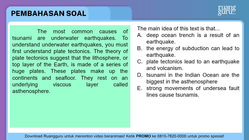Iklan
Pertanyaan
Gunakan PETUNJUK A untuk menjawab soal nomor 31 sampai dengan nomor 45!
Text 1
The most common causes of tsunami are underwater earthquakes. To understand underwater earthquakes, you must first understand plate tectonics. The theory of plate tectonics suggest that the lithospere, or top layer of the Earth, is made of a series of huge plates. These plates make up the continents and seafloor. They rest on an underlying viscous layer called asthenosphere.
Think of a pie cut into eight slices. The pie crust would be the lithosphere and the hot, sticky pie filling underneath would be the asthenosphere. On the Earth, these plates are constantly in motion, moving along each other at a speed 1 to 2 inches (2.5 – 5 cm) per year. The movement occurs most dramatically along fault lines (where the pie cut). These motions are capable of producing earthquakes and volcanism, which, when they occur at the bottom of the ocean, are two possible sources of tsunamis.
When two plates come into contact at a region known as a plate boundary, a heavier plate can slip under a lighter one. This is called subduction. Under water subduction often leaves enormous “handprints” in the form of deep ocean trenches along the seafloor. In some cases of subduction, part of the seafloor connected to the lighter plate may “snap up” suddenly due to the pressure from the sinking plate. This results in an earthquake. The focus of the earthquakes is the point within the earth where the rupture first occurs, rocks break and the first seismic waves are generated. The epicenter is the point on the seafloor directly above the focus.
When this piece of the plate snaps up and sands tons of rock shooting upward with tremendous force, the energy of that force is transferred to the water. The energy pushes the water upward above normal sea level. This is the birth of the tsunami. The earthquake that generated the December 26, 2004 tsunami in the Indian Ocean was 9.0 on the Richter scale - one of the biggest in the recorded history.
The main idea of this text is that...
The main idea of this text is that...
deep ocean trench is a result of an earthquake.
the energy of subduction can lead to earthquake.
plate tectonics lead to an earthquake and volcanism.
tsunami in the Indian Ocean are the biggest in the history.
strong movements of undersea fault lines cause tsunamis.
Iklan
N. Puspita
Master Teacher
4
5.0 (1 rating)
Iklan
Pertanyaan serupa
Tanya ke AiRIS
Yuk, cobain chat dan belajar bareng AiRIS, teman pintarmu!
RUANGGURU HQ
Jl. Dr. Saharjo No.161, Manggarai Selatan, Tebet, Kota Jakarta Selatan, Daerah Khusus Ibukota Jakarta 12860
Produk Ruangguru
Bantuan & Panduan
Hubungi Kami
©2025 Ruangguru. All Rights Reserved PT. Ruang Raya Indonesia



















